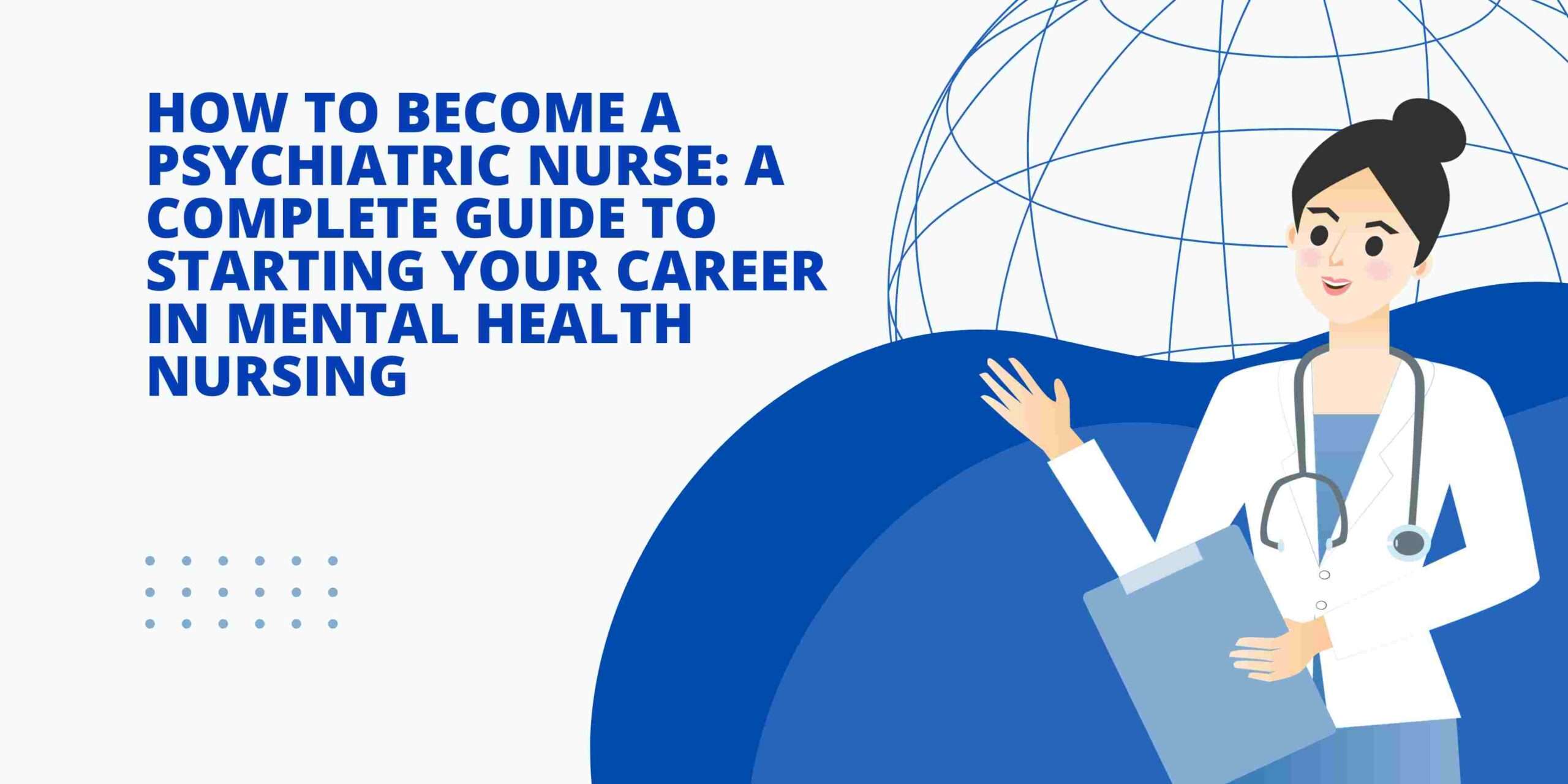How to Become a Psychiatric Nurse: A Complete Guide to Starting Your Career in Mental Health Nursing
Table of Contents
- Introduction
- Who is a Psychiatric Nurse?
- Why Choose a Career in Psychiatric Nursing?
- Key Skills Required for Psychiatric Nurses
- Educational Pathway to Becoming a Psychiatric Nurse
- 5.1 GCSEs and A-Levels
- 5.2 Nursing Degree Courses
- 5.3 Approved Nursing Apprenticeships
- Specialised Mental Health Nursing Courses
- Registration with the NMC (Nursing and Midwifery Council)
- Gaining Clinical Experience
- Types of Psychiatric Nursing Roles
- Work Settings for Psychiatric Nurses
- Daily Duties and Responsibilities
- Challenges in Psychiatric Nursing
- Salary Expectations and Career Growth
- Continuing Professional Development (CPD)
- Work-Life Balance in Mental Health Nursing
- International Opportunities
- Tips for Getting Hired as a Psychiatric Nurse
- Real-Life Testimonials from Psychiatric Nurses
- Future of Psychiatric Nursing
- Conclusion
- Frequently Asked Questions (FAQs)
1. Introduction
Mental health is one of the most critical aspects of overall well-being, and the demand for qualified psychiatric nurses is steadily increasing. If you’re compassionate, resilient, and have a deep desire to make a difference in people’s lives, then becoming a psychiatric nurse could be the perfect career choice for you. This in-depth guide will walk you through everything you need to know about how to become a psychiatric nurse.
2. Who is a Psychiatric Nurse?
A psychiatric nurse, also known as a mental health nurse, is a registered nurse (RN) who specializes in the care of individuals suffering from mental health issues. This can range from anxiety and depression to more complex conditions like schizophrenia, bipolar disorder, and personality disorders.
3. Why Choose a Career in Psychiatric Nursing?
- High Demand: Mental health awareness is growing, and with it, the demand for psychiatric nurses.
- Rewarding Career: You have the opportunity to significantly improve someone’s quality of life.
- Diverse Work Environment: Hospitals, care homes, rehabilitation centers, and community clinics.
- Job Security: Healthcare is a growing sector with stable career paths.
- Opportunity for Advancement: With experience, you can move into leadership or specialised roles.
4. Key Skills Required for Psychiatric Nurses
- Empathy and compassion
- Strong communication skills
- Emotional resilience
- Critical thinking and problem-solving
- Ability to stay calm under pressure
- Understanding of mental health laws and ethics
- Teamwork and collaboration
- Patience and tolerance
5. Educational Pathway to Becoming a Psychiatric Nurse
5.1 GCSEs and A-Levels
To start your journey:
- You’ll typically need 5 GCSEs (grades 9 to 4), including English, Maths, and Science.
- At A-level, Biology or Psychology is highly recommended.
5.2 Nursing Degree Courses
- Enroll in a BSc (Hons) in Mental Health Nursing approved by the NMC.
- Courses usually last three years.
- Includes both academic study and clinical placements.
- Many UK universities offer this course (e.g., King’s College London, University of Manchester).
5.3 Approved Nursing Apprenticeships
- Earn while you learn.
- Offered by NHS and affiliated institutions.
- Combine workplace training with academic study.
6. Specialised Mental Health Nursing Courses
After your general nursing education, you can:
- Pursue postgraduate certificates in CBT (Cognitive Behavioural Therapy), Addiction Therapy, or Child and Adolescent Mental Health.
- Attend workshops and certifications in suicide prevention, trauma-informed care, etc.
7. Registration with the NMC (Nursing and Midwifery Council)
- Mandatory for practicing in the UK.
- After completing your degree, you must register with the NMC.
- Requires a fitness to practice check and successful passing of your course.
8. Gaining Clinical Experience
- During your degree, you’ll complete clinical placements.
- Work in psychiatric hospitals, rehabilitation centers, and GP surgeries.
- You may also work as a Health Care Assistant (HCA) to gain extra experience.
9. Types of Psychiatric Nursing Roles
- Child and Adolescent Mental Health Nurse (CAMHS)
- Adult Mental Health Nurse
- Forensic Psychiatric Nurse
- Substance Abuse Nurse
- Geriatric Psychiatric Nurse
- Community Psychiatric Nurse (CPN)
10. Work Settings for Psychiatric Nurses
- NHS Hospitals and Trusts
- Mental health units
- Community mental health teams
- Private clinics
- Charities and non-profits (e.g., Mind, Rethink Mental Illness)
- Prisons and secure units
- Schools and universities
11. Daily Duties and Responsibilities
- Assessing and planning nursing care for patients
- Administering medications and monitoring effects
- Conducting therapeutic sessions
- Crisis intervention
- Family and caregiver education
- Documenting patient progress
- Collaborating with psychiatrists and psychologists
12. Challenges in Psychiatric Nursing
- Dealing with aggressive or non-cooperative patients
- Emotional exhaustion
- Long and irregular hours
- Burnout and stress
- Managing patient confidentiality and legal complexities
13. Salary Expectations and Career Growth
According to the NHS Agenda for Change:
- Band 5 (Newly qualified): £28,000 – £34,000/year
- Band 6 (Senior Nurse): £35,000 – £42,000/year
- Band 7 and above (Team leader or specialist roles): £43,000 – £50,000+/year
Private sector or agency roles may pay higher.
14. Continuing Professional Development (CPD)
- Required for NMC revalidation every 3 years.
- Can include:
- Attending workshops
- Studying short courses
- Participating in research
- Submitting reflective accounts
15. Work-Life Balance in Mental Health Nursing
- Shift work is common but flexible hours are possible.
- Part-time and remote mental health roles are emerging.
- Self-care strategies are crucial: mindfulness, supervision, and peer support.
16. International Opportunities
With your NMC registration and experience:
- Work in countries like Canada, Australia, New Zealand, UAE, or Ireland.
- You may need additional exams (e.g., NCLEX-RN for USA).
- Cultural sensitivity and mental health laws vary by country.
17. Tips for Getting Hired as a Psychiatric Nurse
- Write a targeted CV and cover letter
- Get references from clinical placements
- Prepare well for competency-based interviews
- Highlight your empathy, patience, and teamwork skills
- Stay updated with latest mental health practices
18. Real-Life Testimonials from Psychiatric Nurses
“I chose this path because I wanted to truly help people who feel lost. Every patient story is different, and I learn something new every day.” – Rachel, Mental Health Nurse, NHS
“It’s emotionally challenging, but seeing someone progress from crisis to stability is the most rewarding part of my job.” – Tom, Psychiatric Nurse, Private Practice
19. Future of Psychiatric Nursing
- Increasing use of telepsychiatry and AI-assisted therapy
- Greater emphasis on preventative care and community outreach
- More funding for mental health services post-COVID-19
- Expanding roles like mental health nurse practitioner and clinical nurse specialist
20. Conclusion
Psychiatric nursing is not just a job — it’s a calling. It requires heart, strength, and a deep understanding of human behavior. If you’re passionate about mental health and want to make a lasting difference, this could be the perfect career for you. From education to experience, this guide gives you all the tools to start your journey and succeed in the field.
21. Frequently Asked Questions (FAQs)
Q1: Can I become a psychiatric nurse without a degree?
No, in the UK, you need a nursing degree approved by the NMC to become a registered psychiatric nurse.
Q2: How long does it take to become a psychiatric nurse?
Typically 3 years if you pursue a full-time BSc in Mental Health Nursing.
Q3: What’s the difference between a psychiatrist and a psychiatric nurse?
Psychiatrists are medical doctors who can prescribe medication. Psychiatric nurses provide ongoing care, therapy, and support but cannot independently prescribe unless additionally trained.
Q4: Is psychiatric nursing emotionally draining?
It can be. That’s why self-care, supervision, and peer support are essential.
Q5: Can I work part-time as a psychiatric nurse?
Yes, part-time, flexible, and agency-based roles are widely available.







